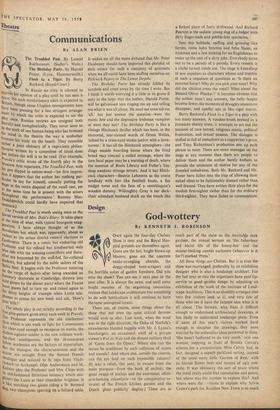Theatre
Communications
By ALAN BRIEN The Troubled Past. By Leonid IN Russia no critic is allowed to express his opinion of a play until he has seen it twice. No such revolutionary edict is expected in ,Britain, though some Utopian managements here have been pressing for a less stringent arrange- ment by which the critic is expected to see the play once. Russian reviews are unsigned both literally and metaphorically. They never seem to his the work of one human being who has bronzed bronzes mind in the theatre the way a sunbather bronzes his body on the beach. They resemble rather a joint obituary of a capricious philan- thropist written by a committee of timid dons lust before the will is to be read. (For example, i, ,ravda's critic wrote of the fourth play in the ,1"loscow Arts repertoire, The Troubled Past, with Ins Pen dipped in cotton-wool—'on first impres- sion it appears that the author has nothing par- ticular to say for himself, casually putting the stage at the entire disposal of the small cast, yet at the same time he is present with the actors throughout the performance.' Ramsay Mac- tknaidovitch could hardly have impaired that sentence) ,,The Troubled Past is worth seeing once as the Soviet version of Mrs. Dale's Diary. It takes place at the time of what, with typical bourgeois exag- geration, I have always thought of as the kevolution but which was, apparently, about as l'iotent as the urban district council elections in Eastbourne. There is a comic but endearing old Professor and his refined but kindhearted wife who side with the winning councillors and there- after are boycotted by the well-fed, fur-collared students but adored by the noble sailors of the Baltic fleet. It begins with the Professor teetering honorary the verge of hubris after being awarded an honorary doctorate at Cambridge, thrown into child gloom by the dinner party where the Fascist beast guests fail to turn up, and raised again to the dizzy heights of triumph when Lenin tele- phones to praise his new book and ask, 'How's Your wife?'
f The Whole play is cut strictly according to the ;Lee Play-pattern given away each week in Pravda. Mass Professor represents the old intellectual but which is too weak to fight for Communism but clear-eyed enough to recognise its merits, the student-agitator-soldier is the new militant work- 1;1g-class intelligentsia, and the ill-mannered ,90W academics are the lackeys of imperialism. nut the dialogue, the characterisation and the action are straight from the Samuel French eatalogue and tailored to • fit reps from Vladi- ve'slock to Archangel. Olga Andovskaya and M. koltsov play the Professor and Mrs. Chips with an old-fashioned flirtatious intimacy which out- glitters the Lunts at their chandelier brightest. It is like watching two giants riding a St. Bernard dog, two champions sparring on a billiard table. It makes me all the more irritated that Mr. Peter Daubeney should have imported this plateful of stale mince for such a company of gourmets when, we all could have been stuffing ourselves on Pickwick Papers or The Lower Depths.
The Birthday Party has already folded its symbols and crept away by the time I write. But I think it worth worrying it a little in its grave if only in the hope that the author, Harold Pinter, will be galvanised into ringing me up and telling me what it was all about. He need not even tell me 'all,' but just answer the question—were the manic Jew and the depressive Irishman vampires or were they not? The Birthday Party is like a vintage Hitchcock thriller which has been, in the immortal, tear-stained words of Orson Welles, `edited by a cross-eyed studio janitor with a lawn- mower.' It has all the Hitchcock atmosphere—the dingy seaside boarding house where the fried bread may conceal a coded message, where the torn local paper may be a warning of death, where the mention of Boots Library and Fuller's Tea- shop awakens strange terrors. And it has Hitch- cock characters—Beatrix Lehmann as the cretin landlady with feet like football boots, a fiat midget torso and the face of a ventriloquist's wooden dummy. Willoughby Gray is her deck- chair attendant husband stuck on the beach like a forked piece of furry driftwood. And Richard Pearson is the sadistic young slug of a lodger with dirty finger-nails and pebble-lens spectacles.
Into this bolthole, sniffing and grinning like ferrets, come John Stratton and John Slater, an Irishman and a Jew looking for an Englishman to make up the cast of a dirty joke. Everybody turns out to be a parody of a parody. Every remark is a cliché turned inside out. The stage is knee deep in non sequiturs as characters whiten and tremble at such a sequence of questions as 'Is there an external force? Why do you pick your nose? Why did the chicken cross the road? What about the Blessed Oliver Plunket?' It becomes obvious that the author hasn't any answers, the belly laughs become fewer, the moments of draughty uneasiness disappear, and apathy sets in like rigor mortis.
Barry Reckord's Flesh to a Tiger is a play with too many answers. A voodoo broth brewed in a Jamaican shanty town, it attempts to act out the tensions of race hatred, religious mania, political frustration, and sexual passion. The dialogue is stuffed as full of metaphors as a copywriter's prose and Tony Richardson's production sets up each phrase in neon. There are more messages on the stage at any moment than there are people to deliver them and the author barely bothers to provide the minimum of motive for any of the frenzied melodrama. Both Mr. Reckord and Mr. Pinter have fallen into the trap of allowing their naked ideas to be fashionably dressed rather than well dressed. They have written their plays for the modish first-nighter rather than for the ordinary third-nighter. They have failed to communicate.












































 Previous page
Previous page